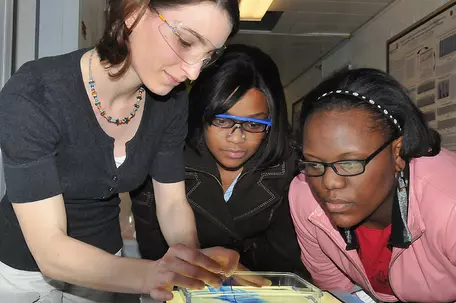Strengthen Workforce Preparation in your Program
Illuminate Career Opportunities to Help Students Prepare Early

Understand the needs of the workforce
In order to prepare your students for the future workforce, you (and they) need to understand what the current workforce looks like. Learn about the needs of and opportunities offered by the future workforce. The page also presents information about employment statistics, information about major employment sectors, and a description of future opportunities that will arise as the current workforce retires.
Integrate Professional Preparation into your Program »
Don't wait until your students are about to graduate to talk with them about potential careers. Learn more about integrating professional preparation into your program from the Building Strong Geoscience Departments project. While aimed at geoscience departments, the information provided is applicable for a range of departments.
Showcase diverse career paths
Explore the wide range of careers, both traditional and non-traditional, available to geoscience graduates. Learn more about geoscience careers from the SAGE 2YC project. Give students a glimpse of a day in the life of a professor or instructor through Cutting Edge's collection of academic career profiles. Explore a variety of career profiles beyond academia from Cutting Edge or through the Building Strong Geoscience Departments web page on non-traditional careers.
Equip Students with Skills and Experience that will Help Them Land a Job

Strengthen communication skills and learn about needed competencies
Strong written and oral communication skills are a highly sought after asset for new hires. The Developing Communication Skills for the Workforce page provides tips on integrating opportunities to strengthen students' communication skills, both in courses and throughout the degree program. The Needed Competencies page identifies and expands upon other important and sought-after competencies identified by employers.
Give credit for internships and other pre-professional opportunities
Internships and other pre-professional opportunities give students hands-on practice in building industry-specific skills while also providing them with a network for finding employment upon graduation. Further, internships can strengthen their soft skills both on the job (with real experience) as well as off the job (e.g. presenting and/or writing up a report on their research and/or experience). Students' classroom work can also improve as a result of completing an internships. Learn more about the benefits of internships and pre-professional opportunities and how to incorporate them into your program.
Incorporate opportunities for interdisciplinary coursework
Offering students dual-credit or paired courses involving two or more departments can build students' skills in interdisciplinary work, communication, teamwork, and other soft skills. It can build a culture of collaboration among students from different disciplinary backgrounds. Problem-solving projects and activities in these courses can strengthen students' ability to work in teams with others from different majors, which, in turn, can help strengthen students' communication skills with those outside their field. This can provide a more holistic perspective to problem-solving by encouraging them to see a given problem through the eyes of different 'stakeholders.' Learn more about interdisciplinary teaching and ways to design inter- or multi-disciplinary courses.
Connect with Employers & Alumni

Maintaining a thriving alumni network can lead to many more advantages. Alumni serve as examples to current students and are often happy to give advice. Strategies from Building Strong Geoscience Departments are identified on these pages:
Build Connections with Employers
Connect your program and your students to local employers and let everyone reap the benefits.
Stay in Touch with Your Alumni
Work with your department's alumni and keep students, faculty and administrators aware of what's going on in the workforce.
Models of Program Design and Implementation
Several of the InTeGrate program models had a particular emphasis on strengthening workforce preparation in their programs. Their program pages are deep descriptions of program design, implementation, and outcomes. From these examples, you can learn how to increase student opportunities through partnerships, bring employers into the classroom, design a robust bridge program with local two-year colleges, and other important activities. You can also see a synthesis of lessons learned about supporting transitions to the workforce, transfer, and careers drawn from the experiences of all the implementation teams.